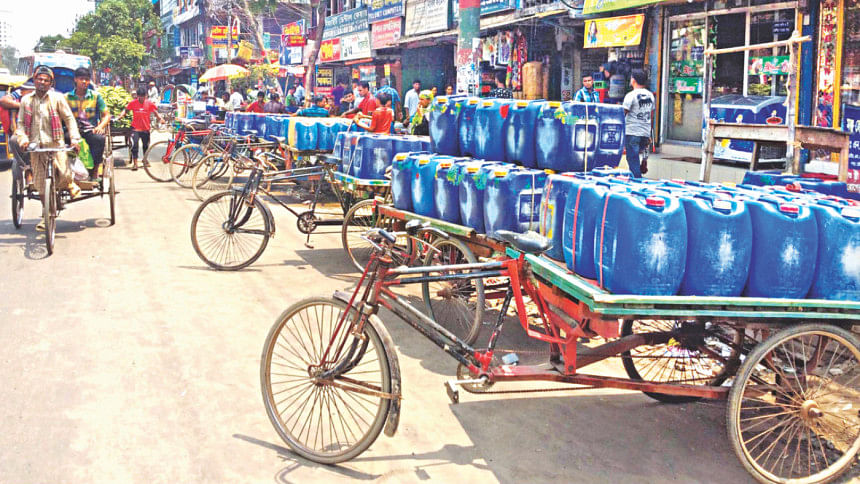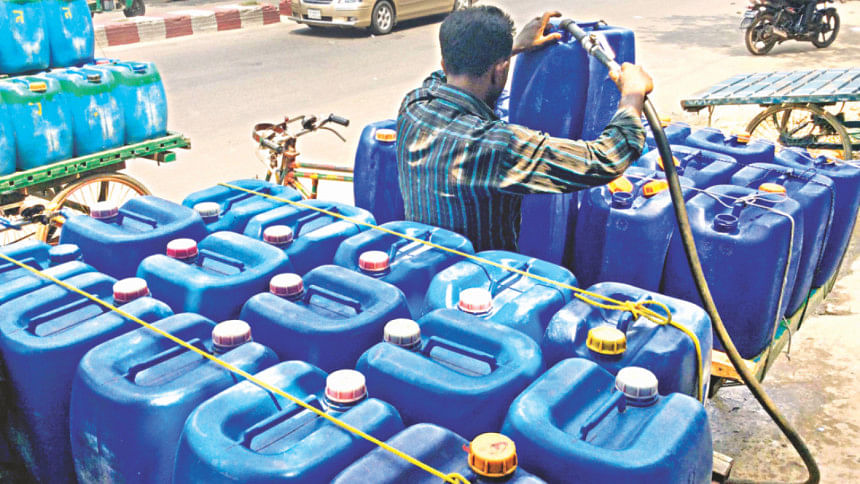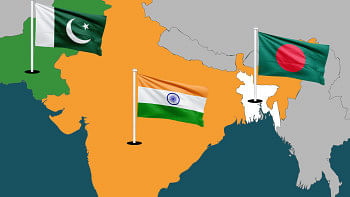Illegal water trading rendering Chittagong city drier

Water, water!
Yells Robiul Hossain while ringing the bell of his rickshaw-van as he leisurely drives through Patenga area of Chittagong city with a van full of water jars.
Business is good for Robiul, who has been selling water at Tk 25 a jar for over a year.
It is a simple deal, he says, adding, he loads his van with the water jars, around 15 of them, and pays Tk 100 for each load.
“There's more profit in selling water. I usually cover Patenga, Halishahar and Charpara areas and can make multiple trips depending on the demand, which is always acute as most of the residents are facing water crisis,” says Robiul as he wipes off his sweat while taking a sip.
A man working hard for the betterment of his family is always commendable. But the only problem with this picture is that the water he is selling is illegally obtained by some unscrupulous residents who are selling the Wasa water commercially from their domestic connections, causing immense sufferings to the dwellers and forcing Wasa to lose a huge amount of revenue.
“We get water once or twice a week from the Wasa lines. Even that is extracted by water sellers. They use pumps and store water in large tanks,” said Abul Hossain, a resident of Patenga's Steel Mill area.

“For the last two years we are not getting a single drop of water but paying a monthly bill of Tk 173. Desperate, we requested the water traders to stop extracting water for some time but they did not pay heed. We have also complained to the Wasa employee who distributes the bill, but to no avail,” he added.
Md Bashar, CWasa meter inspector of Bandartila area, said at least 300-350 consumers are not getting water and have to pay the minimum mandatory connection fee. ”I have informed higher authorities of the revenue department about this water selling business several times, they would take action soon,” he said.
Ziaul Huq Sumon, councilor of South Halishahar Ward, said Wasa could supply water to around 50 thousand residents in his area of 4.5 lakh. “As a result, there is a huge demand.”
Wards 40 and 41 with population around 3 and 1.3 lakh have no water supply as well, said ward councilors Jainal Abedin and Saleh Ahmed Chowdhury, respectively.
People of these areas would collect water in the past from shallow or deep tube wells, but due to the depleting water level, many tube wells cannot extract water, they said.
Now the water has either a salty taste or too much iron and a reddish hue, they alleged, adding, so people are trying to collect drinking water from alternative sources.
Cashing in on this opportunity, some 30 to 40 domestic consumers are selling water from their connections, while the authorities concerned keep on turning a blind eye, alleged residents.
Visiting the areas recently, this correspondent found at least twenty points in Miler Matha, Bandartila, Cement Crossing, and Narikeltola, where Wasa water was being sold from domestic connections. The sellers kept a pipeline from where the jars were filled and then got loaded on the vans.
Rickshaw-van puller Sohel, who also sells water for a living, said he buys water from the connection of one Mohammed Jabed of the Hospital Gate area.
Contacted, Javed denied his involvement in selling water.
Md Jashim, who was also found selling water to van pullers in Bandartila area, said they have permission for selling water. When asked, he could not show the document.
But as per the Wasa officials it is illegal to use domestic connections for commercial usage.
For domestic connections, Wasa charges Tk 7.61 per cubic meter or 1,000 litre, the rate is tripled for commercial use. Wasa spends Tk 15.9 for producing per cubic meter water, said Engr AKM Fazlullah, managing director of CWasa.
“We are losing money in the domestic supplies, but cannot increase the price as we are yet to supply as per demand. Many consumers have to pay the meter connection fee without getting water,” he said.
“Whenever we get an allegation we take action and so far have taken against many,” said Touhidul Islam, who recently took charge as Wasa chief revenue officer.
CWasa Executive Magistrate Hillol Biswas said from January to April this year he had conducted mobile courts and disconnected a total of 44 connections, seized 9 rickshaw-vans (for selling water), four motors (for extracting water), and fined Tk 4.4 lakh across Chittagong city for various irregularities including water selling.
Selling Wasa water from domestic connections is a punishable crime under article 52 of Water Supply and Sewerage Authority Act 1996, he said, adding, the offender could be fined up to Tk 10 thousand or face up to six months' imprisonment or both.

 For all latest news, follow The Daily Star's Google News channel.
For all latest news, follow The Daily Star's Google News channel. 



Comments